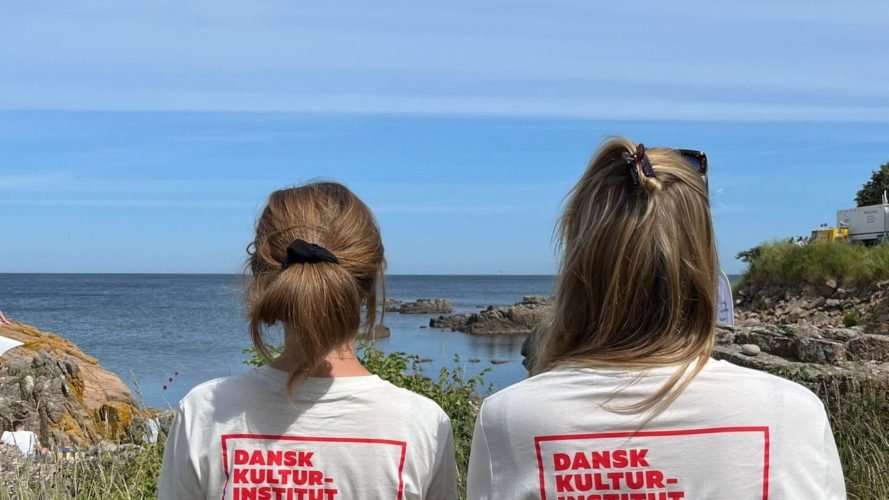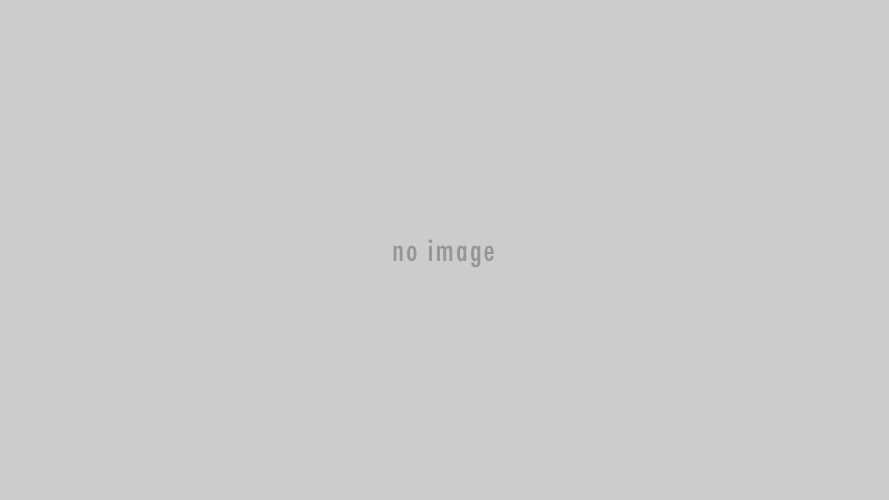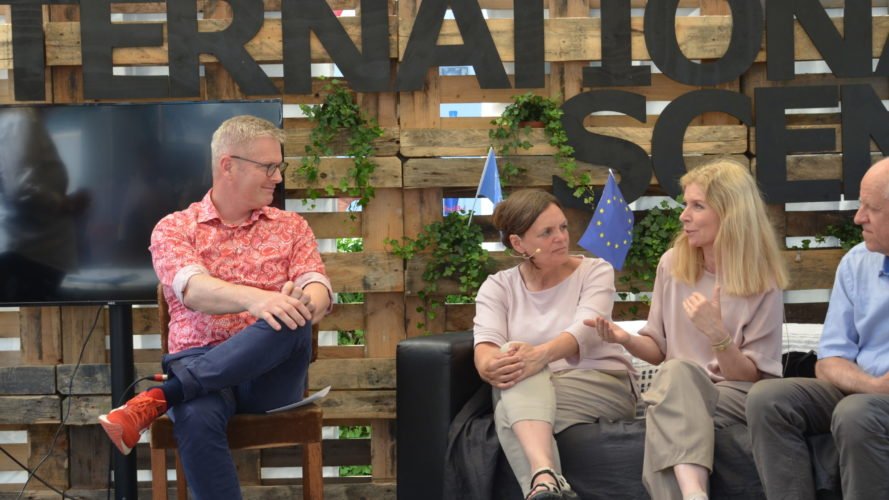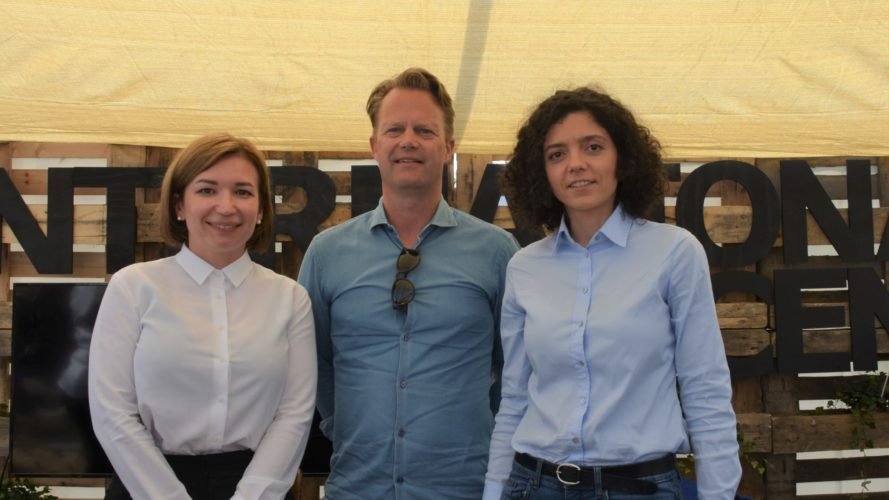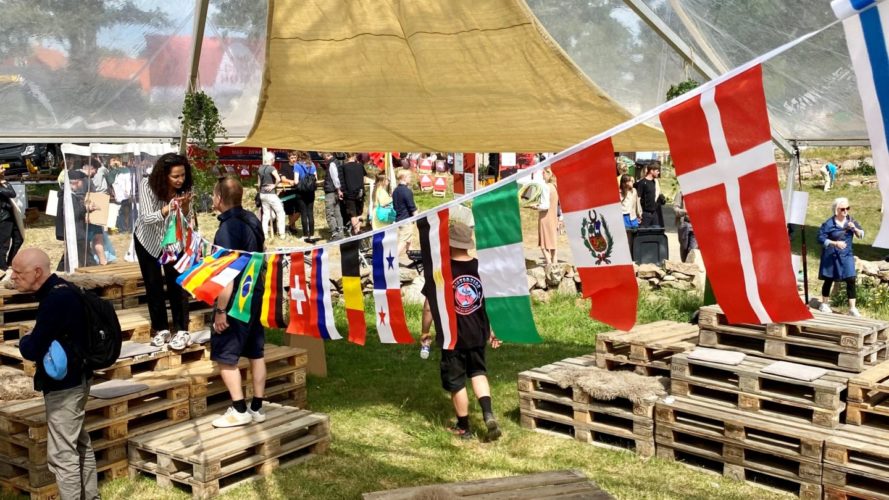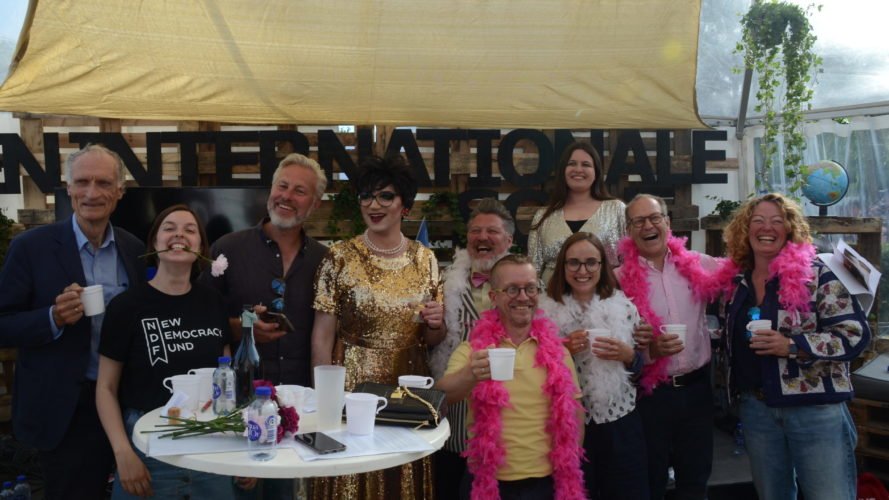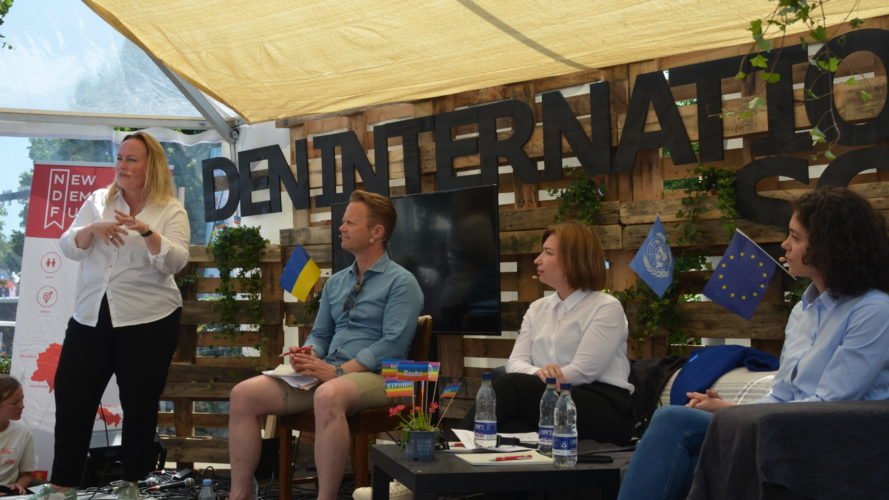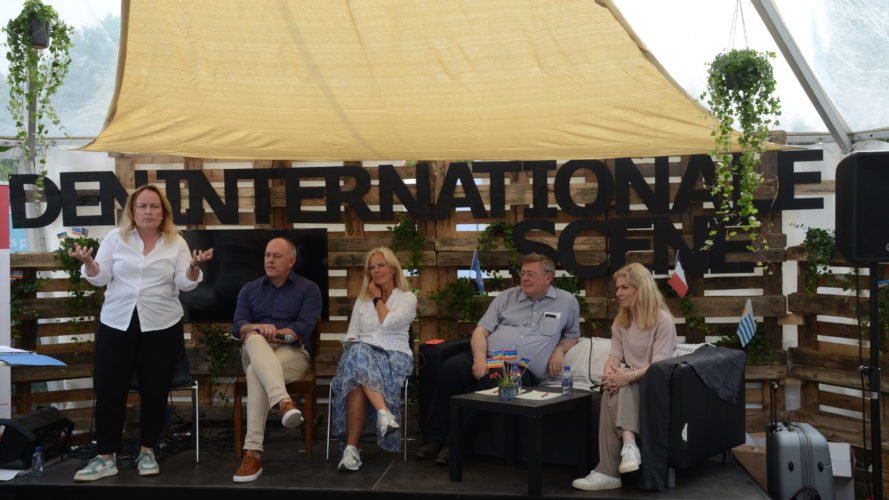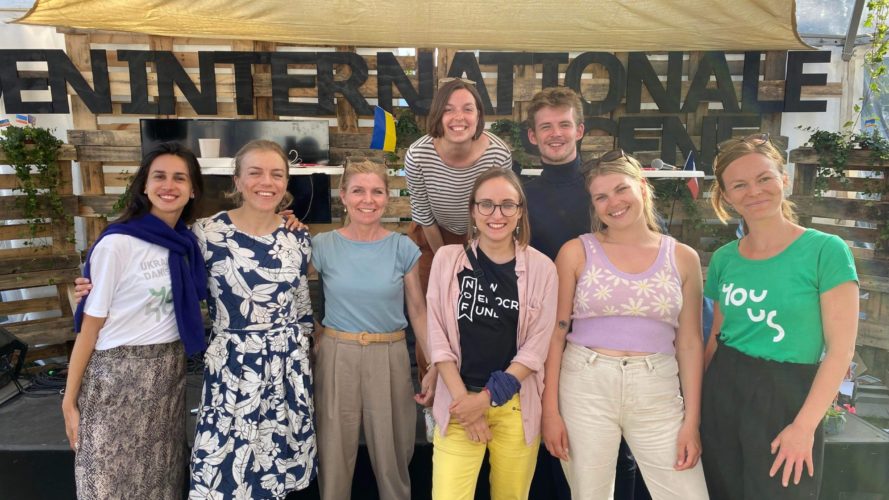Mød os på Folkemødet 2023
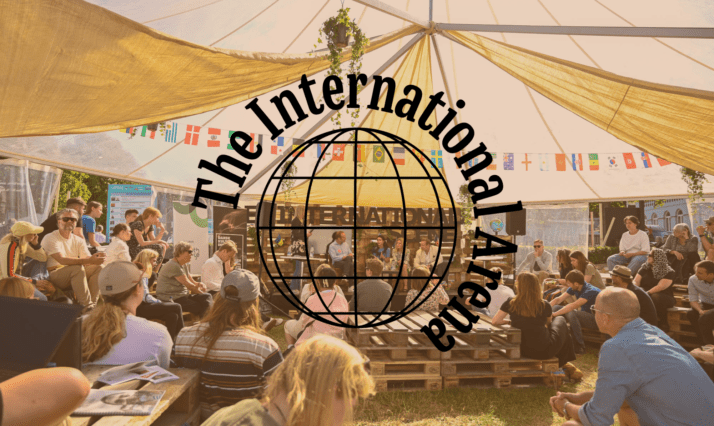
Igen i år sætter vi kursen mod Bornholm for at deltage i Folkemødet 2023, hvor vi er partnere på the International Arena.
Sammen med Danish Institute for Parties and Democracy, IMS (International Media Support), Det Udenrigspolitiske Selskab, Dansk Institut for Internationale Studier, og vores gode kollegaer fra New Democracy Fund, har vi flettet et program sammen med mere end 20 events under temaet ‘Reviving Democracy’.
Nedenfor er et udpluk af programmet (på engelsk) på the International Arena. Se det fulde program, her
Culture as a War Strategy
Thursday, June 15th from 16.45-17.30
Panel:
Henriette Borg Reinholdt, Regional Director, Danish Cultural Institute
Frederik Rosén, Affiliated Associate Professor, Copenhagen University
Nataliya Popovych, Co-founder and director, Ukraine House in Denmark
Moderator:
Charlotte Flindt Pedersen, CEO, The Danish Foreign Policy Society
Host:
Danish Cultural Institute
Culture has long been recognized as a powerful tool in warfare. The use of culture as a war strategy can be seen throughout history, from the propaganda during World War II to the current situation in Ukraine.
In the context of war, culture can be a potent weapon that can influence behaviour and shape attitudes.
One of the most effective ways is through propaganda, the destruction of cultural artefacts and symbols or by promoting one’s cultural values as superior to the enemy’s.
Join Danish Cultural Institute when they investigate the power of culture in wartimes together with a qualified panel. Here they will discuss how culture can be used both as an aggressor and a peacemaker – and how crucial it is to acknowledge that there is nothing soft about cultural affairs in times of conflict and crises.
Shaping a New Europe
Thursday, June 15th from 17.45-18.30
Panel:
Stina Soewarta, Head of Cabinet, European Commission
Tetyana Filevska, Creative Director, Ukrainian Institute
Camilla Mordhorst, CEO, Danish Cultural Institute
Moderator:
Nataliya Popovych, Co-founder and director, Ukraine House in Denmark
Host:
Danish Cultural Institute
Europe has undergone significant changes in the last few years. One of the most pressing issues has been the ongoing conflict in Ukraine, which has affected the political and social landscape.
The war in Ukraine has been a painful reminder of the fragile peace that exists in Europe. It has caused divisions among the countries, and tensions between Russia and the European Union have escalated. However, in the face of adversity, Europe has come together to find solutions and create a new future.
Cultural exchange has played an essential role in creating new and strong bonds between the old and aspiring new EU countries.
In this talk, we will reflect on the importance of protecting and strengthening the new European community seen from a cultural, political, and digital point of view.
Workshop: Dreams for Mykolaiv
Friday June 16th from 8.45-9.45 + Saturday June 17th from 9.30-10.15
Moderators:
Jane Klementieva, Head of Secretariat, The New Democracy Fund
Martin Thaulow, Photographer and CEO, Good People ApS
Host:
The New Democracy Fund
In collaboration with photographer, Martin Thaulow, the New Democracy Fund invites you on a journey to the Ukrainian city of Mykolaiv. A region that, like the rest of Ukraine, has suffered significant losses and destruction during the war.
However, despite the incredibly harsh circumstances, there is a growing willingness among the local youth to rebuild their city for the better.
Denmark has committed itself in particular to help in the rebuilding of Mykolaiv, so it is important that we, as a country and society, understand what is at stake.
Martin Thaulow has recently returned from a long journey to Ukraine. He spent several days in Mykolaiv, where he encountered and documented the lives of young Ukrainians. During this workshop, Martin will establish contact with local youth and provide the Danish audience with first-hand knowledge of the situation. Subsequently, the New Democracy Fund will facilitate a workshop where the audience is invited to contribute with their thoughts and ideas regarding the rebuilding of Ukraine.
After a year of war in Ukraine – what have we learned?
Friday, June 16th from 13.00-13.45
Panel:
Vydoinyk Mykhailo, Ambassador, Embassy of Ukraine in Denmark
Camila Mordhorst,CEO, Danish Cultural Institute
Marie Gad, Director Global Development and Sustainability, Danish Industry (DI)
Lucas Skræddergaard, Member of the executive committee, Danish Youth Council (DUF)
Henrik Underbjerg, Documentary Film Advisor, International Media Support (IMS)
3F -TBA
Moderator:
Julie Arnfred Bojesen, Director, The Ukrainian-Danish Youth House
Host:
The New Democracy Fund
In February 2022, Russia launched a full-scale invasion of Ukraine. Here – more than a year later – the partners behind the New Democracy Fund discuss what they and their local partners have each learned from the war, what they should have done differently – and how we can best help from here.
The fund has invited Ambassador Mykhailo Vydoinyk to participate in the discussion and give his perspective on how we best strengthen and support the rebuilding of Ukraine.
No Direction Home: Meet the Exiled Fighting for Freedom
Friday, June 16th from 15.15-16.00
Panel:
Karam Nacher, Syrian writer and academic, co-founder and co-editor of Al-Jumhuriya, an award-winning independent media platform that provides in-depth coverage and analysis from Syria and the Arab world. Karam Nachar was born in Homs, Syria, but now resides in Istanbul.
Lavon Volski, Belarusian musician, writer, painter, and founder of the Belarusian rock groups Mroja, N.R.M., Zet and Krambambula. Lavon Volski was born in Minsk, Belarus, but now resides in Poland.
Moderator:
Lisbeth Pilegaard, CEO, DIPD
In 2022, the total number of people worldwide who were forced to flee their homes due to conflicts, violence, fear of persecution and human rights violations passed 100 million. This is more than double the people who remained forcibly displaced a decade ago and the most since World War ll.
At Folkemødet 2023, IMS (International Media Support), DIPD and Danish Cultural Institute gather three people, who have little in common except the fact that they have been forced to live in exile, but who continue their work and efforts to create positive change in the country that they have fled from.
Being removed, exiled or displaced does not take away your concern and care for your country and your fellow citizens. Today, new technologies and social networks have made it possible to oppositional figures, journalists and human rights defenders to engage with the people inside the country they have been exiled from, and the options of continuing to being a cultural, political or journalistic force withing their countries of origin have increased dramatically.
Still, the question remains which role you can play when you are physically distant. How does the work of the exiled play out? What are the challenges of working in exile? How do they see their role? How does this play out for independent media? For artists? For oppositional politicians? And why do they keep on engaging with their country of origin, even when they have been exiled for years?
Eurovision Song Contest as soft power – quiz edition!
Friday, June 16th from 17.45-18.45
Panel:
Rasmus Tantholdt, Correspondent, TV 2
Anna Libak, Foreign Editor, Weekendavisen
Søren Liborius, Chief Advisor, European External Action Service
Klaus Bondam, Director of Cruise, Wonderful Copenhagen
Katrine Stevnshøj, Ph.d, University of Copenhagen
Lars Henriksen, Political Officer, Copenhagen Pride
Jon Kyst, Head of Section, European External Action Service
Charlotte Flindt Pedersen, CEO, Danish Foreign Policy Society
Mariia Didenko, Project Officer, The Ukrainian-Danish Youth House
Oleksandra Bulenok, Communication Manager, The Ukrainian-Danish Youth House
Host of the quiz and Judge:
Chantal al Arab and Mila Milica Kovalj
Host:
Danish Cultural Institute
Eurovision began as a diplomatic move to ensure peace in Europe and strengthen the ties between the European countries after World War II.
Ever since, Eurovision has insisted on not being political, but is that really the case?
Our host Chantal al Arab and Eurovision expert Mila Kovalj will quiz us through the tunes of the biggest international music events in the world. Together we will learn more about issues such as: what is the significance of Eurovision in Ukraine and Eastern Europe – and the world in general? What diplomatic trends can we spot in the show? We will look at the political aspects of the show and focus on how and why the show has been (and is) political.
Join us as we challenge two teams against each other in the best quiz style, where we will not only get smarter on Eurovision’s historical and political context but also have a good laugh and listen to great music!
